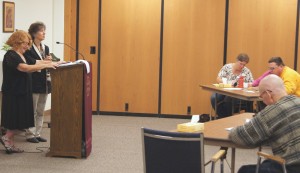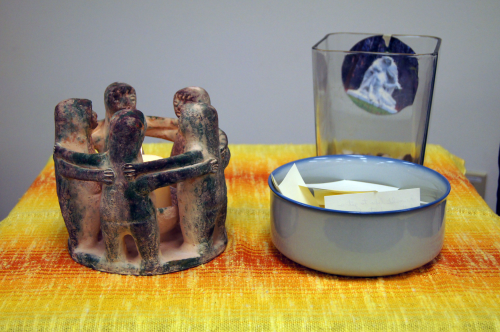
On Saturday, September 26, the Benedictine Center of Spirituality held a retreat on grief and loss led by Kathy McQuillen, a Bereavement Coordinator for Essentia Hospice, and Chris Ketelson, a social worker who helps clients and their families through the process of dying and grief. Twenty-five participants drove through thick fog to listen to the facilitators speak about the process of grief and share their own experiences.
Chris Ketelson said that grief affects how we feel, reason, and behave, and how we maintain connections with others. “It affects one’s health – a person can actually die of grief – and complicates one’s relationship with God, self and others. Bereavement disrupts our reality; it is like sitting at the back of a speedboat, tiller in hand, and suddenly losing grip on the tiller. For a moment you feel completely out of control and panicky, only with grief it goes on and on.”
In table sharing, we found that many felt overwhelmed with guilt after the funeral was over and family dispersed. Some felt intense anxiety that came out in irrational thoughts and fears. Eventually we got through this, only to discover that with each subsequent loss we grieve all over again for every death.
People who have suffered a loss must learn to live with grief so that it does not forever disrupt life. Allow yourself to experience the pain so you can accept the reality of a loved one’s death. Slowly adjust to changes in finances, roles, or routine, adapting to a new normal. In time you will accept your new identity. Revise your long-range plans and rekindle hope for the future, so that slowly you will get on with the task of living.
Allow yourself time to grieve. Be patient with yourself; seek the support of friends, family, clergy or health professionals. Learn to manage stress; take care of yourself physically, emotionally and spiritually. Develop a sustaining philosophy of life, so that you can once more hope in the future and eventually recover your sense of humor. Honor your loss and honor the personal growth it has brought. Pray, meditate, and find beauty and inspiration in what you have gone through. Express your grief through writing and art.
Chris Ketelson spoke of her experiences with grief therapy for children who have lost fathers, mothers or beloved grandparents. The young people know that they are not alone because others feel as they do. Some come back for several sessions as they continue to live through their grief. One girl, who had gone through the experience and is now 15 years old, returned this year to be a helper and tell her own story. Chris said she was able to reach the younger children as a peer.
Grief experienced can be transforming. Margaret Hasse said in her poem, Meadowlark, that,
what hurt you today
was taken out of your heart
by the meadowlark
who slipped the silver needle
of her song
in and out of the grey day
and mended what was torn.
When Oscar Wilde was released from prison, he wrote to a friend, “My desire to live is as intense as ever, and though my heart is broken, hearts are made to be broken: that is why God sends sorrow into the world. The hard heart is the evil thing of life and of art. I have also learnt sympathy with suffering. To me, suffering seems now a sacramental thing that makes those whom it touches holy. I think I am in many respects a much better fellow than I was, and I now make no more exorbitant claims on life. […] I see that any materialism in life coarsens the soul.”

